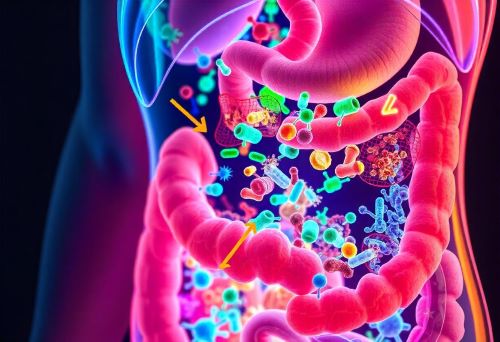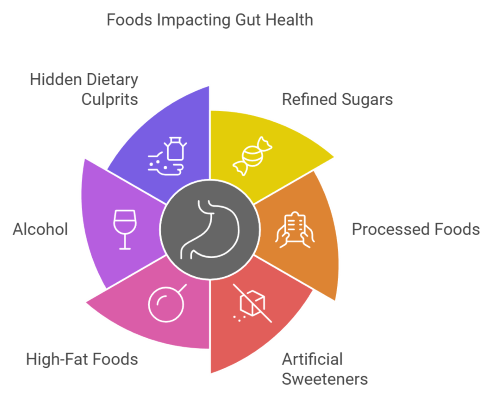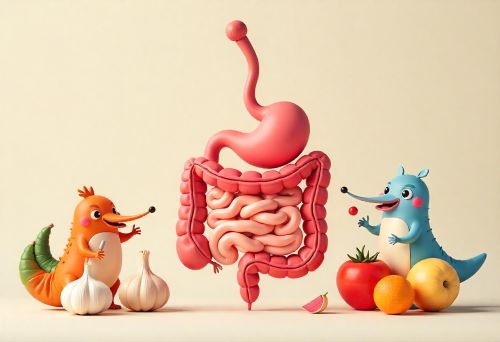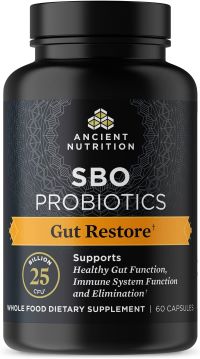1. Introduction
Why Gut Health Matters
Gut health plays a pivotal role in maintaining overall wellness. The gut isn’t just responsible for digesting food; it houses trillions of microorganisms collectively known as the gut microbiome. These tiny organisms impact digestion, nutrient absorption, immune system function, and even mood regulation. A healthy gut can improve energy levels, skin health, and mental clarity, while a compromised gut can lead to bloating, fatigue, and chronic health conditions.
The Role of Diet in Gut Health
What you eat significantly influences the balance of good and bad bacteria in your gut. Foods rich in fiber, probiotics, and prebiotics nourish beneficial microbes, promoting a robust digestive system. Conversely, consuming the wrong foods can disrupt this balance, fostering harmful bacteria and triggering inflammation. This disruption can lead to uncomfortable symptoms and long-term issues, like irritable bowel syndrome or even mental health challenges.
Introducing the Worst Foods for Gut Health
Many common foods we consume daily can quietly harm our gut. From sugary snacks to processed meals, these items wreak havoc on the delicate ecosystem in your digestive tract. The worst foods for gut health are often hidden in plain sight, making it essential to identify and minimize their impact.
This blog will explore what makes these foods harmful, highlight specific culprits, and delve into the hidden dangers they pose to your digestive and overall health. Understanding these details empowers you to make smarter choices and support your gut microbiome effectively.
By being aware of the worst foods for gut health, you can start making small but impactful changes to prioritize your digestive health and well-being.
Affiliate Disclaimer
This blog post may include links to affiliate sites. If you click on an affiliate link and make a purchase, we may earn a small commission or receive other compensation at no extra cost to you. Please note that many of the links on our site are affiliate links. Our use of these links does not impact the products, services, or websites we recommend to you. This disclaimer covers all forms of communication with you, including our website, email, phone, social media, products, and other platforms.
Amazon Affiliate Disclaimer
We participate in the Amazon Services LLC Associates Program, an affiliate marketing program that allows us to earn fees by linking to Amazon.com and its affiliated sites. If you click on an Amazon affiliate link on our site and make a purchase, we may receive a small commission at no additional cost to you.
2. What Makes a Food Bad for Gut Health?
The Role of the Gut Microbiome
Your gut microbiome is a complex community of trillions of bacteria, fungi, and other microorganisms that live in your digestive tract. These microbes are crucial for breaking down food, absorbing nutrients, and maintaining immune function. When the balance between beneficial and harmful bacteria is disturbed, it can lead to digestive discomfort, inflammation, and a host of other health issues. The worst foods for gut health typically disrupt this balance, allowing harmful bacteria to thrive while depleting beneficial microbes.

How Harmful Foods Disrupt Digestive Balance
Foods that negatively impact gut health often trigger inflammation irritate the lining of the digestive tract or deplete essential nutrients that support the microbiome. For example, high-sugar diets can feed harmful bacteria, while processed foods lacking fiber fail to provide the nutrients needed by good bacteria. Over time, this can weaken the gut lining, leading to conditions like leaky gut syndrome, which allows toxins and partially digested food particles to enter the bloodstream.
Another way these foods harm gut health is by reducing microbial diversity. A diverse microbiome is essential for resilience against infections and chronic conditions. Unfortunately, the worst foods for gut health—such as those laden with artificial additives or trans fats—contribute to a monoculture of harmful bacteria, reducing the gut’s ability to function optimally.
Signs Your Gut Health is Compromised
It’s important to recognize when your gut health may be suffering due to poor dietary choices. Common symptoms include bloating, gas, irregular bowel movements, fatigue, and even skin issues like acne. Chronic exposure to harmful foods may also lead to mood disturbances like anxiety or depression, as the gut and brain are closely connected through the gut-brain axis.
By understanding the characteristics of the worst foods for gut health and their effects on your microbiome, you can take proactive steps to reduce their consumption. Replacing these foods with gut-friendly options can significantly improve your overall well-being and help restore a healthy, balanced microbiome.
3. The Worst Foods for Gut Health
Refined Sugars and Their Gut-Disrupting Effects
Refined sugars are one of the worst foods for gut health. These sugars, found in candy, pastries, sugary drinks, and many processed snacks, act as fuel for harmful bacteria in the gut. Overconsumption of sugar promotes the growth of pathogenic bacteria and yeast, like Candida, which can throw your microbiome out of balance. This imbalance may lead to issues such as bloating, cramping, and inflammation. Sugary diets are also linked to leaky gut syndrome, a condition where the gut lining becomes permeable, allowing toxins to enter the bloodstream.

Processed and Ultra-Processed Foods
Processed foods are often low in fiber and rich in artificial additives, unhealthy fats, and preservatives, making them detrimental to gut health. Fiber is essential for feeding beneficial bacteria in the gut. Without it, these microbes can’t thrive, leading to reduced microbial diversity. Additionally, artificial additives and preservatives in ultra-processed foods can irritate the gut lining and cause inflammation. Foods like packaged snacks, frozen meals, and instant noodles are prime examples of the worst foods for gut health.
Artificial Sweeteners and Their Impact on Gut Bacteria
Many people turn to artificial sweeteners as a low-calorie alternative to sugar, but these substitutes can be just as harmful to gut health. Sweeteners like aspartame, sucralose, and saccharin have been shown to alter the composition of gut bacteria, reducing microbial diversity and increasing the prevalence of harmful strains. This imbalance can negatively affect digestion and even lead to glucose intolerance over time.
High-Fat and Fried Foods Causing Inflammation
Fried foods and those high in trans and saturated fats can also disrupt gut health. These foods slow digestion and contribute to inflammation in the digestive tract, which can lead to discomfort and exacerbate gut-related issues. Trans fats, commonly found in margarine, baked goods, and some fried foods, are particularly harmful as they promote inflammation throughout the body. This inflammatory response can further disrupt the gut microbiome.
Excessive Alcohol Consumption and Its Toll on Gut Health
Alcohol, especially when consumed in excess, can wreak havoc on gut health. It irritates the gut lining, leading to inflammation and an increased risk of leaky gut syndrome. Alcohol also disrupts the balance of gut bacteria by killing off beneficial microbes while allowing harmful ones to flourish. Over time, regular alcohol consumption can contribute to chronic gut issues and weaken the digestive system's resilience.
Hidden Culprits in Everyday Diets
Many of the worst foods for gut health are hidden in everyday meals. For example, seemingly healthy foods like flavored yogurts, granola bars, and sauces may contain high levels of added sugars or artificial sweeteners. Similarly, fast food items often combine processed ingredients, trans fats, and excessive sodium, creating a triple threat to gut health.
By identifying and minimizing these harmful foods, you can protect your gut and promote a healthier, more balanced microbiome. Small changes, such as reducing sugar intake, avoiding artificial sweeteners, and opting for whole, unprocessed foods, can make a significant difference in your gut health over time.
4. Hidden Dangers of These Foods
Increased Risk of Chronic Inflammation
One of the most insidious effects of the worst foods for gut health is their ability to trigger chronic inflammation. Refined sugars, artificial additives, and unhealthy fats create an environment in the gut that fosters harmful bacteria and weakens the gut lining. When this barrier is compromised, it allows toxins and pathogens to enter the bloodstream, prompting the immune system to respond with persistent inflammation. Over time, this low-grade inflammation has been linked to serious health issues, including heart disease, diabetes, and autoimmune disorders.

Compromised Immune Function
The gut is often referred to as the body's "second brain," but it also plays a crucial role as a key immune system regulator. A significant portion of the immune system resides in the gut, relying on a healthy microbiome to function effectively. The worst foods for gut health, such as processed snacks, fried foods, and sugary beverages, disrupt the microbial balance, weakening the immune system's ability to fight off infections. Frequent colds, allergies, and even more severe illnesses can result from a compromised gut.
Link to Mental Health Issues Like Anxiety and Depression
Emerging research highlights the connection between gut health and mental well-being through what’s known as the gut-brain axis. The worst foods for gut health, particularly those high in sugar, unhealthy fats, and artificial additives, can negatively impact the production of neurotransmitters like serotonin, much of which is produced in the gut. This disruption can contribute to mood disorders such as anxiety and depression. Additionally, an imbalanced microbiome can increase stress hormone levels, further exacerbating mental health challenges.
Long-Term Health Risks
The hidden dangers of consuming the worst foods for gut health extend beyond short-term discomfort or digestive upset. Persistent intake of these foods can lead to long-term conditions such as irritable bowel syndrome (IBS), leaky gut syndrome, and even increased susceptibility to chronic diseases. For example, diets high in processed foods and artificial ingredients have been linked to a higher risk of colorectal cancer and metabolic disorders.
By understanding the hidden dangers of these harmful foods, you can take proactive steps to limit their presence in your diet. Replacing them with whole, nutrient-rich options can protect your gut health, strengthen your immune system, and improve overall quality of life.
5. How to Protect Your Gut Health
Identifying and Reducing Harmful Foods
The first step to protecting your gut health is recognizing which foods are causing harm. Many of the worst foods for gut health, such as sugary snacks, processed meals, and fried items, may already be staples in your diet. Take time to read ingredient labels carefully. Watch for hidden sugars, artificial sweeteners, and trans fats, which can often be found in unexpected places like salad dressings, cereals, and flavored yogurts. Once identified, begin to reduce your consumption of these foods gradually. Cutting back on them doesn’t require an overnight overhaul but rather steady, manageable changes that you can sustain long-term.

Alternatives to Common Gut-Unfriendly Foods
Replacing the worst foods for gut health with healthier alternatives can transform your digestive well-being. For example:
- Swap refined sugars with natural sweeteners like honey or maple syrup.
- Replace processed snacks with fresh fruits, nuts, or seeds.
- Use whole grains such as quinoa or brown rice instead of refined grains.
- Choose baked or grilled options instead of fried foods.
Incorporating fermented foods like yogurt with live cultures, kimchi, sauerkraut, and kefir can also support your gut by introducing beneficial bacteria. These alternatives not only promote a healthier microbiome but also keep you feeling satisfied and energized.
Supporting Gut Health with Probiotics and Prebiotics
Probiotics and prebiotics are essential allies in maintaining a healthy gut. Probiotics are live bacteria that help replenish your gut microbiome, while prebiotics are fibers that feed those good bacteria. Foods rich in probiotics include yogurt, kombucha, and miso, while prebiotics can be found in bananas, garlic, onions, and whole grains. Together, they work to restore balance and mitigate the effects of the worst foods for gut health.
For additional support, consider taking high-quality supplements designed to improve gut health. Probiotic supplements can provide a concentrated dose of beneficial bacteria, especially if your diet has been unbalanced for some time.
For those looking to enhance their gut health with a reliable probiotic, Probiotics by Ancient Nutrition is a top choice. This supplement combines a high-potency blend of beneficial bacteria strains, including Lactobacillus and Bifidobacterium, scientifically shown to improve digestion and support immune function.
👉 Learn more about Probiotics by Ancient Nutrition Probiotic Formula and check the latest offers here.

Building Gut-Healthy Habits
Beyond food choices, habits like drinking plenty of water, managing stress, and exercising regularly also contribute to a healthier gut. Hydration aids digestion, stress management reduces gut-related issues, and physical activity helps maintain a balanced microbiome.
By combining the elimination of the worst foods for gut health with the adoption of gut-friendly practices, you can create a strong foundation for long-term digestive and overall health. These changes not only protect your gut but also enhance your immune system, energy levels, and mental well-being.
6. Conclusion
Recap of the Worst Foods for Gut Health
Maintaining gut health is essential for overall well-being, and diet plays a crucial role in supporting a balanced and thriving microbiome. Unfortunately, many common dietary choices can disrupt this balance, leading to inflammation, digestive discomfort, and even chronic health issues. The worst foods for gut health include refined sugars, processed and fried foods, artificial sweeteners, and excessive alcohol. These foods harm your gut by feeding harmful bacteria, depleting beneficial microbes, and damaging the gut lining.
Encouragement for Positive Change
Improving gut health doesn’t have to mean a complete dietary overhaul. Small, consistent steps like reducing sugary and processed foods while incorporating whole, fiber-rich, and fermented options can make a significant difference. Replacing harmful choices with gut-friendly alternatives empowers your microbiome to function optimally, benefiting digestion, immunity, and even mental well-being.
Call to Action
Take the first step toward better gut health today. Start by identifying the worst foods for gut health in your daily meals and replacing them with nourishing alternatives. Prioritize your digestive health and enjoy the ripple effects of improved energy, immunity, and overall quality of life.
FAQs
1. What are the worst foods for gut health?
- Artificial sweeteners: Disrupt gut bacteria and increase inflammation.
- Fried foods: Contain trans fats that harm microbiota and cause inflammation.
- Processed foods: Additives and low fiber harm gut health.
- Red meat: Raises harmful TMAO levels and promotes inflammation.
- Refined grains: Starve good bacteria due to low fiber.
- Refined sugar: Kills good bacteria and spikes inflammation.
- Alcohol: Damages gut lining and reduces good bacteria.
2. How do these foods harm gut health?
They disrupt the balance of good and bad bacteria, causing inflammation, poor digestion, and reduced microbiome diversity.
3. Why is red meat bad for the gut?
It increases TMAO (linked to heart disease), promotes inflammation and may transfer antibiotic-resistant bacteria.
4. Are refined grains harmful?
Yes, they lack fiber, feed harmful bacteria, and cause blood sugar spikes.
5. What makes artificial sweeteners worse than sugar?
They reduce gut bacteria diversity more significantly and increase inflammation markers.
6. Can fried foods harm more than digestion?
Yes, they promote harmful bacteria, systemic inflammation, and weaken immunity.
7. Are processed foods dangerous for the gut?
Yes, additives like emulsifiers harm gut bacteria, while low fiber content disrupts microbiome balance.
Takeaway
Avoid these foods to protect your gut; focus on fiber-rich whole foods instead.


